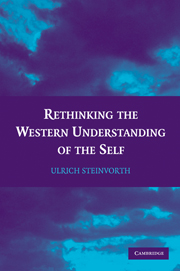Book contents
- Frontmatter
- Contents
- Preface
- Part I Introduction
- Part II Basics of Philosophical Psychology
- Part III The Cartesian Self in History
- Part IV Value Spheres
- Chapter 10 A First Diagnosis and Therapy for Modernity
- Chapter 11 Value Spheres Defined and the State
- Chapter 12 The Serving Spheres
- Chapter 13 Technology
- Chapter 14 Utilitarian or Cartesian Approach
- Chapter 15 The Media and the Professions
- Chapter 16 Science
- Chapter 17 Art and Religion
- Chapter 18 Sport
- Chapter 19 Latin and Absolute Love
- Part V A Self-Understanding Not Only for the West
- Select Bibliography
- Index
Chapter 11 - Value Spheres Defined and the State
Published online by Cambridge University Press: 05 June 2012
- Frontmatter
- Contents
- Preface
- Part I Introduction
- Part II Basics of Philosophical Psychology
- Part III The Cartesian Self in History
- Part IV Value Spheres
- Chapter 10 A First Diagnosis and Therapy for Modernity
- Chapter 11 Value Spheres Defined and the State
- Chapter 12 The Serving Spheres
- Chapter 13 Technology
- Chapter 14 Utilitarian or Cartesian Approach
- Chapter 15 The Media and the Professions
- Chapter 16 Science
- Chapter 17 Art and Religion
- Chapter 18 Sport
- Chapter 19 Latin and Absolute Love
- Part V A Self-Understanding Not Only for the West
- Select Bibliography
- Index
Summary
Let us start with asking which kind of activities can be recognized as value spheres at all, what is implied by their recognition, and by which criteria we can distinguish them.
In answering this question, we can refer to Weber. He understood that the past glory of the West was based on value spheres that attracted individuals and challenged their ambition of extraordinariness by their specific meanings. He was not the first to understand this. Hegel had already distinguished spheres in his system of modern civilization by both the functions they have for society and the meanings they have for the individual. He distinguished what he called the objective and the absolute spirit and differentiated the first into family, civil society (which is economy), and the state, and the second into religion, art, and science. His distinction of objective and absolute spirit points to an important difference among value spheres not mentioned by Weber. All sphere activities require judgment, so they are “spirit.” But those of the first class (of the family, economy, and politics) objectively serve the survival of a society, however much they are subjectively felt to be done for other reasons. Those of the second class are activities that find their meaning in themselves and are served by the activities of the first class. This is why Hegel calls their spirit absolute. I'll follow Hegel's distinction, though not his terminology, and call the spheres of the first class serving, and those of the second class nonserving, spheres.
- Type
- Chapter
- Information
- Rethinking the Western Understanding of the Self , pp. 101 - 110Publisher: Cambridge University PressPrint publication year: 2009

